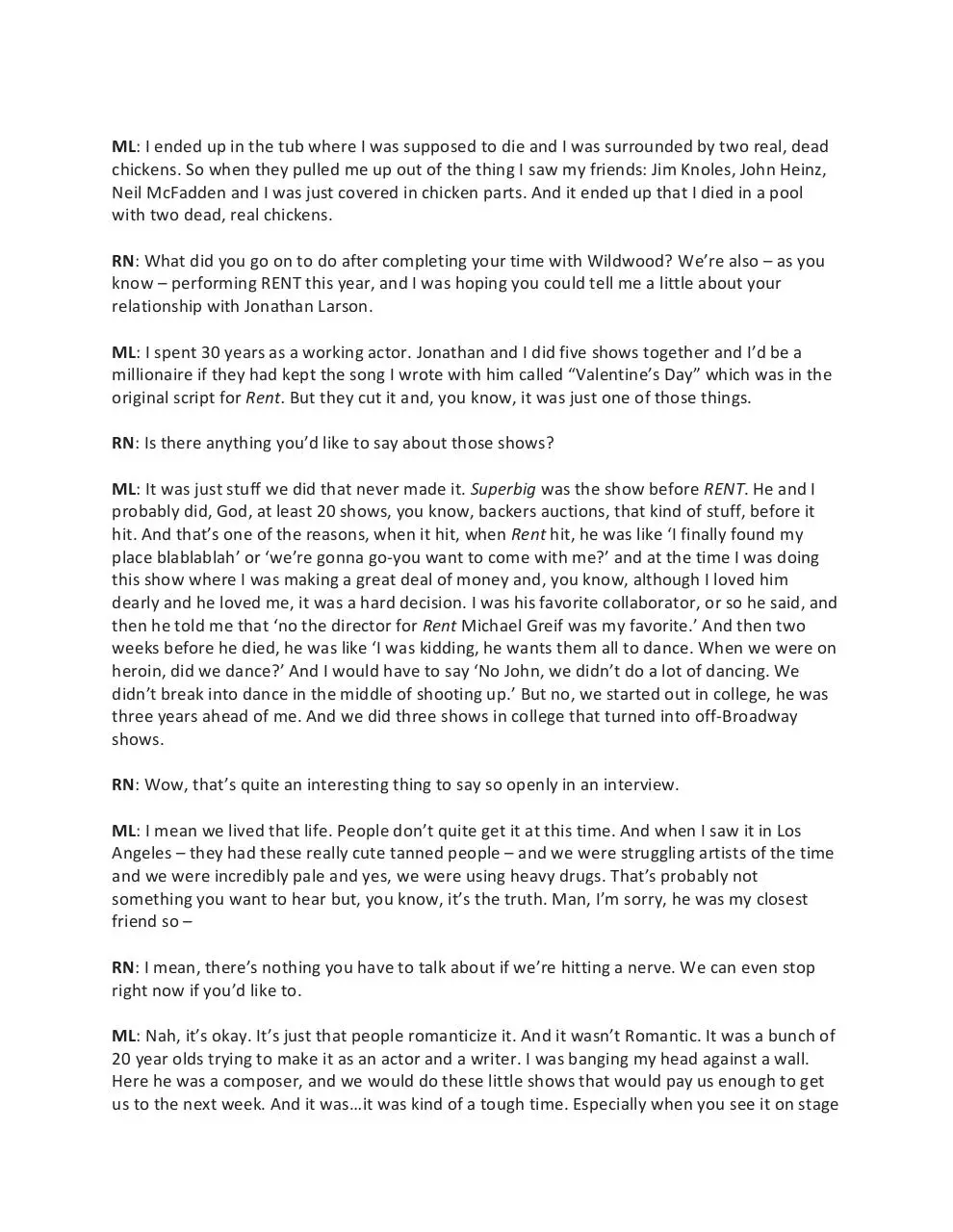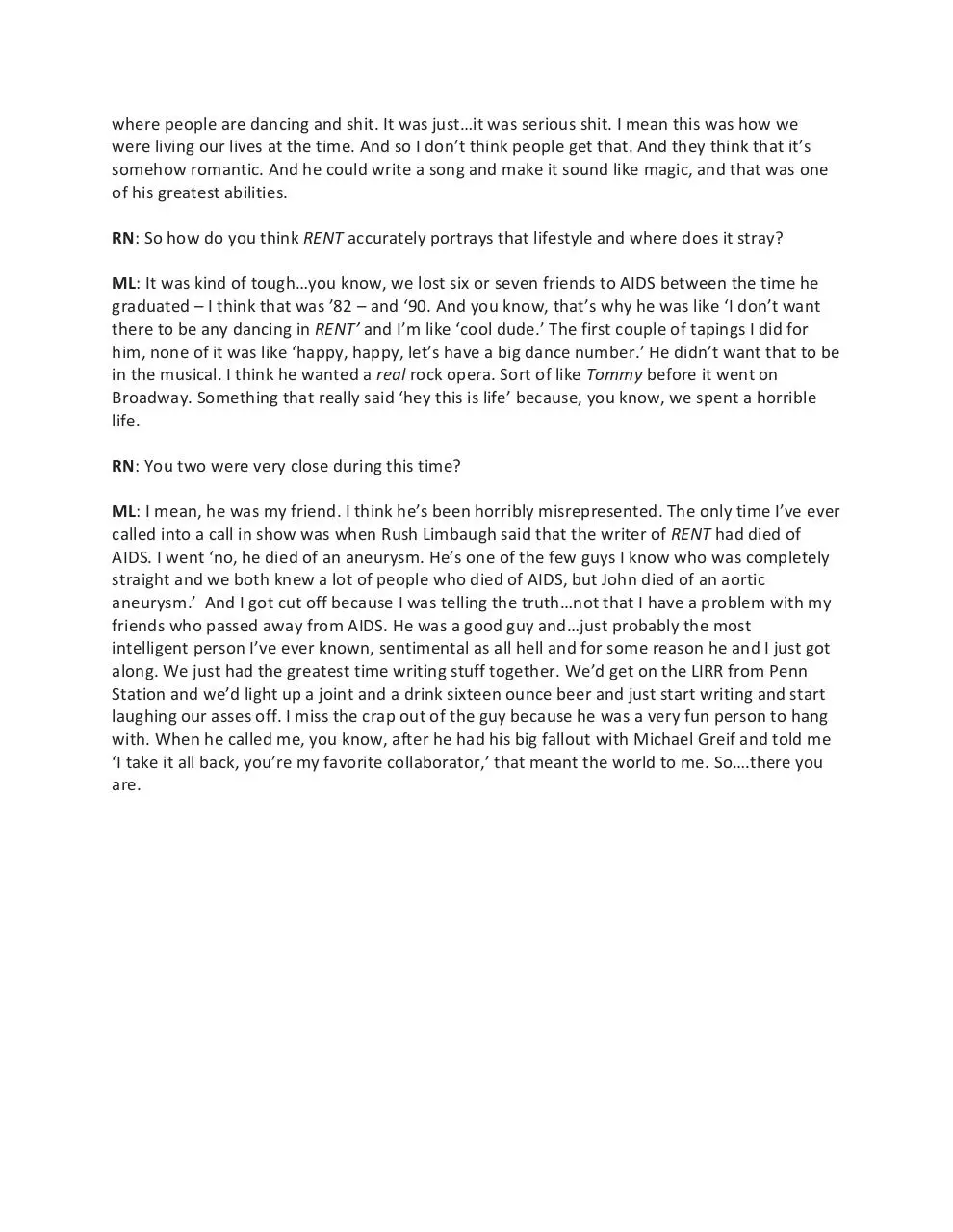Michael Lindsay Interview (PDF)
File information
Author: Devin Goodman
This PDF 1.5 document has been generated by Microsoft® Word 2013, and has been sent on pdf-archive.com on 24/05/2015 at 20:34, from IP address 173.79.x.x.
The current document download page has been viewed 420 times.
File size: 317.64 KB (3 pages).
Privacy: public file



File preview
Rocky Nunzio: Hi Michael! I was wondering if you could start by talking about how you got
involved with Wildwood.
Michael Lindsay: I auditioned like anybody else. It was the biggest thing in town. I had just been
doing some Reader’s Theatre or New Playwrights -- that’s how old I am. I auditioned for Kiss Me
Kate and I got, you know, I played Batista Harry Trevor and it just went on from there. A few
years later I directed.
RN: What show did you direct?
ML: I directed Anything Goes
RN: And how many years did you stay involved with Wildwood?
ML: I was involved with Wildwood for four seasons.
RN: Do you have a favorite memory with Wildwood that you’d like to share?
ML: I still hang out with all the people that I was with in that first season: Jim Knowles, Sean
Hines, Chris Murphy, Mike Patterson. These are all people that you have no idea who they are,
but they were all the techies. Dan Schultz and I just hung out with them for many years, and we
maintained a friendship through thick and thin. And when things get really nasty it’s really nice
to come back and have people remember you and like you. And Veronica Mariani! Don’t forget
Verni!
RN: You said your first show with Wildwood was as an actor in Kiss Me Kate?
ML: Yes, I always played old men. I don’t know why because I had hair down to my butt. I think I
had like two lines. So yeah, that was the first one. And it was really great. We had a great time.
RN: And what was your last show?
ML: The last show that I did was Kismet and I played the Wazir and uh…I got the chicken, at the
special show. I don’t know if you guys use rubber chickens.
RN: We still use the chicken.
ML: Well, yeah. But do you use real chickens?
RN: Oh, you guys used real chickens?
ML: Yes.
RN: Oh, we changed to the rubber chicken at some point I guess.
ML: I ended up in the tub where I was supposed to die and I was surrounded by two real, dead
chickens. So when they pulled me up out of the thing I saw my friends: Jim Knoles, John Heinz,
Neil McFadden and I was just covered in chicken parts. And it ended up that I died in a pool
with two dead, real chickens.
RN: What did you go on to do after completing your time with Wildwood? We’re also – as you
know – performing RENT this year, and I was hoping you could tell me a little about your
relationship with Jonathan Larson.
ML: I spent 30 years as a working actor. Jonathan and I did five shows together and I’d be a
millionaire if they had kept the song I wrote with him called “Valentine’s Day” which was in the
original script for Rent. But they cut it and, you know, it was just one of those things.
RN: Is there anything you’d like to say about those shows?
ML: It was just stuff we did that never made it. Superbig was the show before RENT. He and I
probably did, God, at least 20 shows, you know, backers auctions, that kind of stuff, before it
hit. And that’s one of the reasons, when it hit, when Rent hit, he was like ‘I finally found my
place blablablah’ or ‘we’re gonna go-you want to come with me?’ and at the time I was doing
this show where I was making a great deal of money and, you know, although I loved him
dearly and he loved me, it was a hard decision. I was his favorite collaborator, or so he said, and
then he told me that ‘no the director for Rent Michael Greif was my favorite.’ And then two
weeks before he died, he was like ‘I was kidding, he wants them all to dance. When we were on
heroin, did we dance?’ And I would have to say ‘No John, we didn’t do a lot of dancing. We
didn’t break into dance in the middle of shooting up.’ But no, we started out in college, he was
three years ahead of me. And we did three shows in college that turned into off-Broadway
shows.
RN: Wow, that’s quite an interesting thing to say so openly in an interview.
ML: I mean we lived that life. People don’t quite get it at this time. And when I saw it in Los
Angeles – they had these really cute tanned people – and we were struggling artists of the time
and we were incredibly pale and yes, we were using heavy drugs. That’s probably not
something you want to hear but, you know, it’s the truth. Man, I’m sorry, he was my closest
friend so –
RN: I mean, there’s nothing you have to talk about if we’re hitting a nerve. We can even stop
right now if you’d like to.
ML: Nah, it’s okay. It’s just that people romanticize it. And it wasn’t Romantic. It was a bunch of
20 year olds trying to make it as an actor and a writer. I was banging my head against a wall.
Here he was a composer, and we would do these little shows that would pay us enough to get
us to the next week. And it was…it was kind of a tough time. Especially when you see it on stage
where people are dancing and shit. It was just…it was serious shit. I mean this was how we
were living our lives at the time. And so I don’t think people get that. And they think that it’s
somehow romantic. And he could write a song and make it sound like magic, and that was one
of his greatest abilities.
RN: So how do you think RENT accurately portrays that lifestyle and where does it stray?
ML: It was kind of tough…you know, we lost six or seven friends to AIDS between the time he
graduated – I think that was ’82 – and ‘90. And you know, that’s why he was like ‘I don’t want
there to be any dancing in RENT’ and I’m like ‘cool dude.’ The first couple of tapings I did for
him, none of it was like ‘happy, happy, let’s have a big dance number.’ He didn’t want that to be
in the musical. I think he wanted a real rock opera. Sort of like Tommy before it went on
Broadway. Something that really said ‘hey this is life’ because, you know, we spent a horrible
life.
RN: You two were very close during this time?
ML: I mean, he was my friend. I think he’s been horribly misrepresented. The only time I’ve ever
called into a call in show was when Rush Limbaugh said that the writer of RENT had died of
AIDS. I went ‘no, he died of an aneurysm. He’s one of the few guys I know who was completely
straight and we both knew a lot of people who died of AIDS, but John died of an aortic
aneurysm.’ And I got cut off because I was telling the truth…not that I have a problem with my
friends who passed away from AIDS. He was a good guy and…just probably the most
intelligent person I’ve ever known, sentimental as all hell and for some reason he and I just got
along. We just had the greatest time writing stuff together. We’d get on the LIRR from Penn
Station and we’d light up a joint and a drink sixteen ounce beer and just start writing and start
laughing our asses off. I miss the crap out of the guy because he was a very fun person to hang
with. When he called me, you know, after he had his big fallout with Michael Greif and told me
‘I take it all back, you’re my favorite collaborator,’ that meant the world to me. So….there you
are.
Download Michael Lindsay Interview
Michael Lindsay Interview.pdf (PDF, 317.64 KB)
Download PDF
Share this file on social networks
Link to this page
Permanent link
Use the permanent link to the download page to share your document on Facebook, Twitter, LinkedIn, or directly with a contact by e-Mail, Messenger, Whatsapp, Line..
Short link
Use the short link to share your document on Twitter or by text message (SMS)
HTML Code
Copy the following HTML code to share your document on a Website or Blog
QR Code to this page

This file has been shared publicly by a user of PDF Archive.
Document ID: 0000245334.